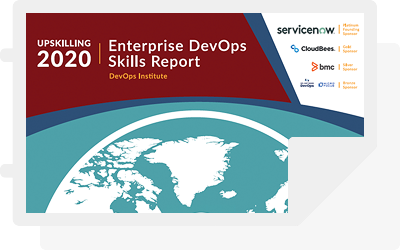Admit it, you’re curious about DevOps. You’d have to be living in a cave not to have heard of DevOps, and if that were the case or you weren’t a little curious, you wouldn’t be reading this, right now. Well, that’s good. We’re here today to talk about DevOps; what it is and why it’s important to your business.
There’s no mistaking the business community if fascinated by DevOps, and this disruptive model is, every day, increasing productivity for companies across all industries. There’s no escaping it. But why would you want to?
DevOps has one primary initiative to achieve: continuous integration to continuous delivery. In doing so, the development and operations processes become faster and more resource friendly, and companies are able to save money while producing more, high-quality software products for customer consumption or internal use.
What’s in a Name? The Meaning of DevOps
A name means a lot when it comes to DevOps, which includes a business model widely considered to be a marriage of two historically competitive departments: development and operations. For businesses considering DevOps for the first time, the name of the game is collaboration, and it starts with greater communication, which must be facilitated to achieve the goals of DevOps.
In the following article, we’re going to talk about DevOps, offering a basic explanation of what it is and an introduction as to how it works, why it’s important and what you can expect from a DevOps team. Stay tuned for all you need to know to get started with DevOps.
DevOps: A Basic Overview
For DevOps, it has been uncharacteristically hard to pin down a single consensus on a working definition. To get a basic understanding of DevOps, it’s easier to start with the problem that DevOps seeks to solve:
Historically, development teams and operations teams struggle with communication and collaboration because they have competing goals. Operations teams want to see development completed efficiently and with as few resources spent as possible to complete the job to scope. Conversely, development teams want to make sure the job gets done completely and to high quality, regardless of the resources required to achieve success.
These competing goals sometimes make communication and collaboration frustrating and tense. The irony is that being on opposing teams does nothing to ensure that resources are allocated appropriately or that the job is completed to quality.
That’s where DevOps comes in. DevOps is more than a business modality. It’s a culture shift because when DevOps is involved, everyone is aligned toward the same goals and those goals are transparent from the top down. One idea behind DevOps is that when everyone understands their role in the process, they will be more inclined to work together toward the communal goal.
DevOps also puts information technology, and specifically software and website development, at the core of every business. In this way, it’s like a business model. It creates a functional framework for how to structure your business with IT in the center, specific instructions not included.
The vagueness around DevOps continues to contribute to its intrigue amongst business leaders. Whether or not the DevOps movement has longevity remains to be seen, but we suspect it’s disruptive enough to make a lasting impact.
Introduction to DevOps: How It Works
DevOps has an overarching goal of creating a development environment that supports continuous integration and continuous delivery. This is infused into the framework by four key principles of DevOps in action:
- Continuous integration (CI)
- Continuous delivery (CD)
- Continuous testing
- Continuous monitoring
Each of these is described in greater detail below for DevOps beginners:
Continuous Integration
Continuous integration occurs when multiple pieces of source code and developmental elements come together to create a finished software product or feature. Each piece is usually designed by a specific person or team as part of a sprint, an exercise important to this process.
Continuous Delivery
Continuous delivery is both an extension and an outcome of continuous integration. It’s the process in which software is tested to allow for constant delivery of features.
Continuous Testing
To ensure CD, continuous testing is required. This is a process where the application is validated against requirements. If this occurs in a sprint, it’s to ensure the requirements of the sprint have been met.
Continuous Monitoring
The need for automation tools is apparent in the monitoring process, or the part of the method where software or a new feature is monitored for bugs, security, and compliance.
Why is DevOps Important?
The existence of DevOps stems from Agile principles that were adopted when enterprise businesses realized that their linear waterfall processes weren’t working as well as they should be. As an evolution of agile, DevOps focuses on speed, resourcefulness and customer satisfaction.
Through continuous processes, developers are able to speed up development times, rolling out new features to customers often. This creates an environment where customer satisfaction is also continuous. That’s new territory for digital businesses that rely on customer satisfaction to be successful. With many new possibilities for businesses adopting DevOps, it’s a trend not expected to disappear any time soon.
Roles & Responsibilities in DevOps
In another blog we covered an in-depth look at the kinds of job titles and roles you can expect to see in a DevOps organization, and why the industry is torn on these labels. In this blog, we will offer a quick overview of the titles and associated roles you can expect to see in DevOps:
- DevOps or Platform Engineer
- Build Engineer
- Reliability Engineer
- Release Manager
- Data Analyst
- Product Manager
DevOps/Platform Engineer
This is someone who understands diverse coding languages to support the platform. Titles you might see are DevOps Engineer or Platform Engineer, and these represent the person at the foundation of the movement.
Build Engineer
This is any person responsible for the software build from conceptualizing through delivery. Some titles include Build Engineer, UX Designer, and Configuration Manager. This role ensures orchestration, development, and testing of all software, features, automation, and configurations.
Reliability Engineer
As a reliability engineer uses a calculated mish-mash of coding and automation orchestration to ensure the software product meets the requirements set out for it. Titles in this realm include Reliability Engineer and Site Reliability Engineer. This role ensures security and the reliability of the many systems that create a DevOps framework.
Release Manager
The release manager is also known as a release engineer. In this role, they serve a management function to ensure the orchestration of release with build engineers. They are often the ones who roadmap the entire flow of the delivery process.
Data Analyst
The data analyst uses public and proprietary data to make determinations about user satisfaction that impact the direction of the organization and programming efforts. This is an important role in data processing that requires critical thinking and end-user engagement. Some titles you may see in this modality are data analyst or QA analyst.
DevOps: More Than a Model
Unanimously, DevOps has been difficult to define. That’s in part due to its abstract nature, and in part to an inability to qualify it. Sure, it’s more than a business model, it’s a cultural change that requires facilitated guidance and total buy-in. It’s a framework implemented at the ground levels of an operation that relies on transparency, trust, collaboration, and communication to increase productivity and customer satisfaction.
Let BMC be your partner for creating a culture of DevOps in your organization. We are a trusted name in DevOps, providing the latest in DevOps information and software to consumers. For more information on how you can function as a digital enterprise, download this primer on digital transformation.







